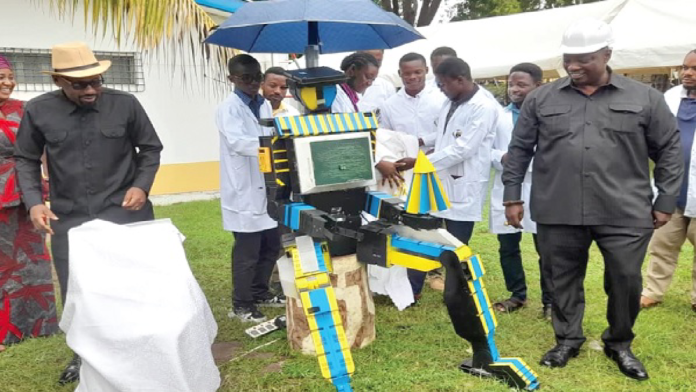
Students and faculty members from the Engineering department at the Ghana Communication Technology University (GCTU) in Accra have collaborated to develop a robot aimed at offering comprehensive information about the university’s engineering programs.
Titled “Royal de Robo,” this innovative creation incorporates an integrated sensor within its plastic head, allowing it to pivot and focus on nearby visitors. Subsequently, it provides details about the array of available courses within the faculty. Moreover, the device offers aspiring students and parents insights into the prerequisites necessary for pursuing programs in Telecommunication Engineering, Electrical and Electronics Engineering, Computer Engineering, and Mathematics. Additionally, it presents information regarding potential career prospects for students.
Operated using electricity and situated on a wooden platform, the robot features an automatic umbrella on its head that opens during rainfall and retracts when the weather clears. Built from recycled electronic waste materials, the robot boasts plastic legs and arms. It’s been dedicated to the university’s Vice-Chancellor, Professor Emmanuel Ohene Afoakwa.
During the robot’s unveiling ceremony, Dr. Ruhiya Abubakar, the acting Dean of the Faculty of Engineering at GCTU, expressed her excitement, highlighting that this innovation represents the university’s inaugural foray into such technology. She emphasized the students’ active involvement in the project, aimed at offering them hands-on experience in preparation for larger endeavors.
Dr. Abubakar also shared plans for a forthcoming robot that will provide campus directions and further insights into the university’s programs. Reflecting on the global shift towards artificial intelligence (AI), she noted that the robot’s complexity would be better appreciated when its intricate construction and autonomous information provision are witnessed.
Professor Afoakwa projected that GCTU will achieve full university status in three years, with a clear focus on transforming into a hub for communication technology. This transformation, he explained, aligns with the goal of becoming a leader in human capital development related to information and communications technology, as well as various associated disciplines.
Highlighting their vision to establish a technological nucleus for Ghana and the West African sub-region, he likened the institution’s aspirations to that of Silicon Valley. Prof. Afoakwa stressed the significance of this transformation in fostering innovation, creativity, and technological advancements that will aid in training human skills for Ghana’s ongoing digitalization agenda.
He underscored the university’s existing advanced programs, including Electrical and Electronics Engineering, Computer Engineering, Mathematics, and the Department of Telecommunications Engineering, which offers diploma, bachelor’s, master’s, and doctoral-level telecommunication courses. Prof. Afoakwa expressed enthusiasm for these departments to serve as pivotal centers of technological innovation, ultimately shaping Ghana’s technological landscape.





